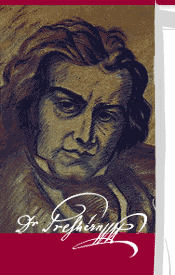| |
|
|
| 1828 |
Prešeren's first job in Ljubljana |
|
| |
|
|
 |
rešeren's mother in particular wanted
him to work in provincial government, as a state employee,
which was not a simple matter in those days. During Metternich's
absolutist regime, the sons of the German aristocracy
and bourgeoisie, irrespective of the grades they achieved
and their success at university, took precedence over
educated Slovenes. The young law graduate started his
first job in 1828, working for the lawyer Leopold Baumgartner.
Maybe it was a coincidence - or maybe not - that Prešeren's
first employer was considered in Ljubljana to be a freethinker,
a "freigeist". Prešeren, too, could be described as such,
particularly because of his relaxed attitude to religion,
as well as to state and church politics. At first, Prešeren
shared lodgings with Miha
Kastelic, another man trying his hand at literature
and later the publisher of Kranjska čbelica (The Carniolan
Bee). Literary history, however, does not paint a very
kind picture of Kastelic - he was considered a rather
dubious character. Prešeren's mother, too, found the company
her son was keeping unsuitable and she soon persuaded
France to move, together with his sister Katra, to live
with his uncle Jožef, a priest. Moreover, the poet's mother
never resigned herself to her son being a lawyer, a profession
which she considered to be morally questionable and therefore
not to God's liking. Consequently, in addition to his
job, France soon started working without pay as an apprentice
in various state offices, in order to increase his chances
of getting a permanent post. But his mother's worries
were not over: she badly wanted to marry her son off and
enclose him in the secure and comfortable confines of
bourgeois life as soon as possible. At this point we will
not try to guess what this would have meant for the development
of Slovene literature, but it is very likely that France
would have had a happier life "on this earth". In 1829,
his mother and uncle thus arranged for France to meet
Marija Johana Khlun, a rich young German woman from Graz
in Styria. The few reliable sources from that time show
that at first France liked Marija Johana, but he was soon
scared off and started to weigh a rich dowry against his
freedom and independence. A part of the poet's thinking
can perhaps be explained with the verse "A dowry, priceless
far above all mark" from the sonnet O,
Vrba. And we must not overlook Prešeren's characteristic
attitude to women. Marija Khlun was considerably older
than his other muses who were, as a rule, young girls.
She was also very fond of him, which was in contrast to
his other attempts at love. After his initial enthusiasm,
Prešeren started withdrawing from Marija; he did not reply
to her numerous letters and generally neglected all contact
with her, but he never summoned up the courage to have
a serious talk with her. This did prick his conscience,
as can be seen in some of his poetry (Sonetje nesreče
- Sonnets of Unhappiness), whilst his general despondency
and dissatisfaction with himself were also responsible
for the very bad results he achieved at the legal examinations
he sat in Klagenfurt in
1832. Until then, he had always excelled academically,
but now he only just scraped through and this was one
of the main reasons for the subsequent rejections of his
applications to have his own legal practice.
|
|
| |
|
|
| |
|
|
   |
|
|
|
|


